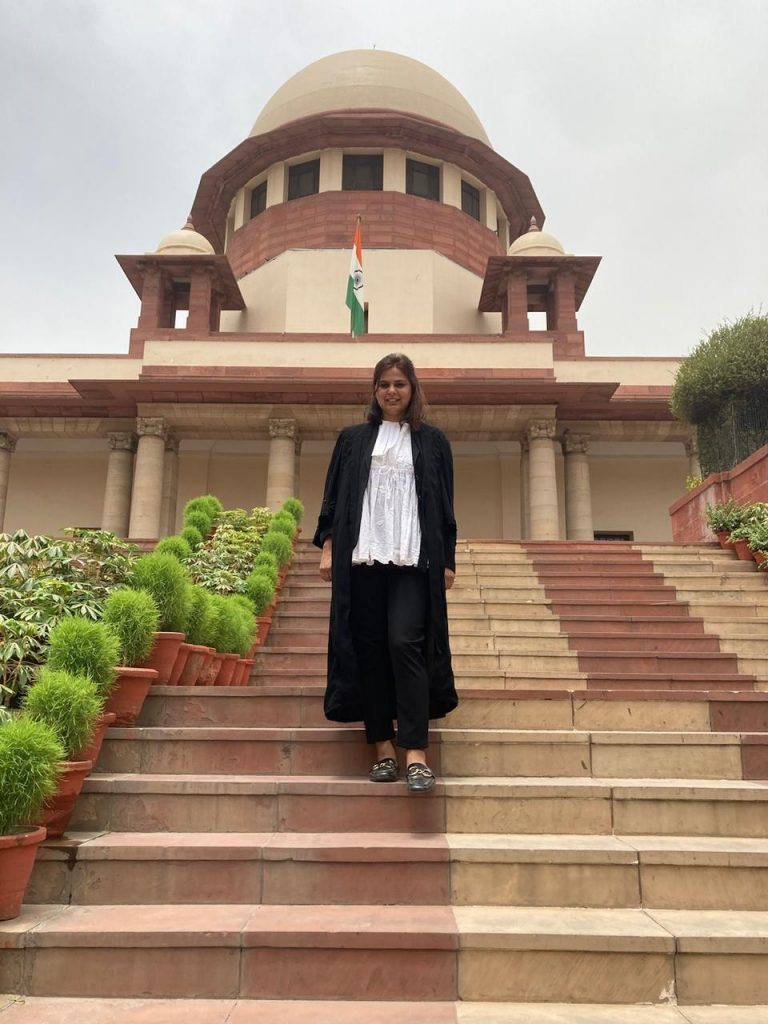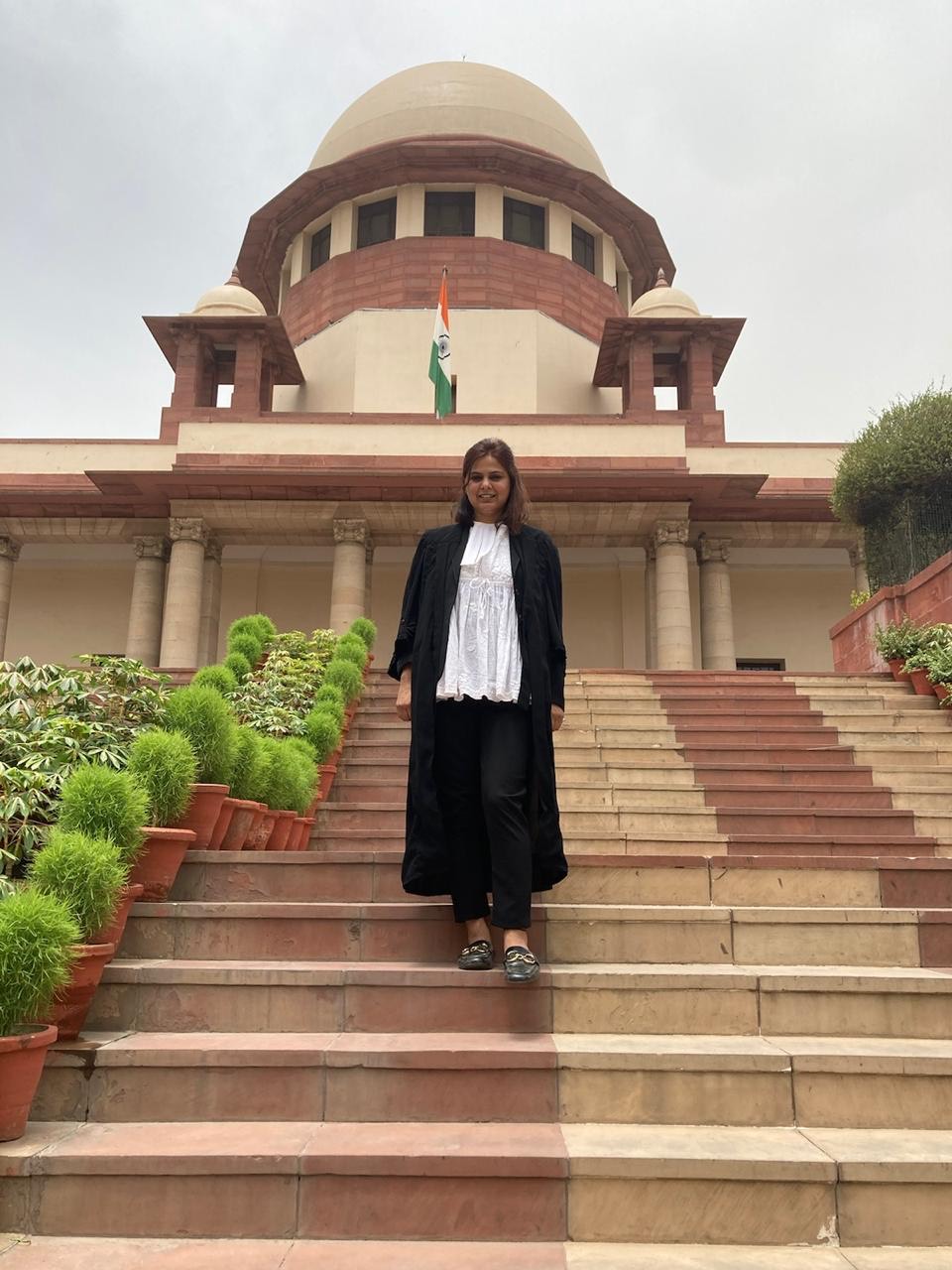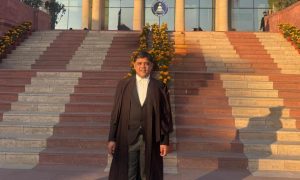This interview has been published by Anshi Mudgal and The SuperLawyer Team

Coming from a science background, was pursuing law a deliberate decision for you? How did you prepare to gain admission to Chanakya National Law University, Patna?
This question brings back a wave of nostalgia, and I find it hard to decide where to begin—it’s quite a story. I belong to a generation where most students were drawn towards either medicine or engineering. After completing my 12th in 2007, I, too, took a gap year to prepare for engineering entrance exams. In 2008, I had secured admission to an engineering college through my AIEEE rank.
However, my father, an IITian himself, always had a keen interest in law that ultimately inspired me to consider law as a profession. 2008 was also, if I recall correctly, the inaugural year of the CLAT examination. At his encouragement, I decided to take the exam, and soon after, I found myself admitted to CNLU, Patna—without having spent even a single day in an engineering classroom.
My father often says, “Law is nothing but science,” and it wasn’t long after stepping into this noble profession that I realized how true this is. Law is fundamentally rooted in logic and reason. Looking back, I am grateful for the redirection and for discovering a field where I truly belong.
You have significant experience in education law and have represented clients in cases such as the NEET UG Test 2024 case. What do you believe are the most pressing legal challenges currently faced by students and educational institutions in India?
Talking in legal context, students are among the most vulnerable segments of society, and it deeply concerns me when they are forced to seek relief through the courts. I have had the privilege of representing and seeking relief for several students who, after completing their MBBS degrees from foreign universities, were denied eligibility certificates by the National Medical Commission (NMC). This certificate is essential for appearing in the Foreign Medical Graduate Examination (FMGE), which is a prerequisite for practicing medicine in India. Unfortunately, in some cases, the NMC denies these certificates due to non-fulfilment of specific conditions.
The situation is particularly distressing for students who, after investing more than five years to earn their MBBS degrees, find themselves unable to practice in India due to technicalities. These students are left with no choice but to approach the courts.
Similarly, I have encountered cases where students are denied admission or faced issues related to unfair examinations, such as those arising in NEET-UG 2024. For instance, I had the opportunity to represent tribal students from Meghalaya in the NEET-UG 2024 dispute.
On the other hand, educational institutions also face significant challenges, particularly regarding recognition from regulatory bodies like the University Grants Commission (UGC) or the All India Council for Technical Education (AICTE). One particularly intriguing case I am currently handling involves a dispute over granting recognition for a dual-mode university (for running conventional and open courses both) to a university with “Open” in its name.
In addition to these issues, there are numerous disputes concerning fee regulation, inadequate infrastructure, reservations, and other systemic challenges within the education sector. These matters highlight the pressing need for robust policies and a student-centered approach to ensure that education serves its intended purpose effectively.
In your early years of practice, you worked with various advocates and law firms, handling diverse areas such as Constitutional Law, Civil Law, Arbitration Law, and the Law of Limitation. How did these experiences shape your approach to litigation, and what key lessons did you take away from them?
When I joined law school, one thing I was certain about was my desire to practice in courts. I never had any second thoughts about it. However, when I initially entered the profession, adapting to court life was quite challenging. During those early years, I was exclusively practicing in the Delhi High Court as I was working under the guidance of Hon’ble Mrs. Justice Mini Pushkarna, who was then Standing Counsel for Municipal Corporation of Delhi. I was fortunate enough to have regular appearances before the High Court on a daily basis and that gave me confidence and encouragement to handle the matters in Court even in adverse situations. I have many anecdotes also which I would never forget.
However, contrary to what it may seem to beginners, litigation is not solely about appearing in court and presenting arguments. It encompasses much more. The process, from drafting a case to getting it listed before the court, is a journey in itself. Litigation also involves various registry-related tasks, which are crucial for any lawyer to learn and understand. In my experience, I firmly believe that a lawyer first has to become a clerk to grasp the basics of the profession and its importance one would realise after beginning her/his own practice. It didn’t take long for me to realize the immense physical and mental effort required in this field.
Another vital lesson I learned over time—though I underestimated its significance in the beginning—is the importance of client handling. As lawyers, we are not only officers of the court but also advocates for our clients’ interests. Effective client management is a core skill for building a successful legal practice. A lawyer must understand client’s needs, build trust, communicate effectively, and provide advice within ethical boundaries.
Currently, at Indus Law Associates, you handle litigation and arbitration before the Hon’ble Supreme Court of India, the Delhi High Court, the Meghalaya High Court and various District Courts. Can you share one of the most challenging cases you’ve encountered, and how did you approach your preparation for it?
While working in my current office, I have had the opportunity to handle a variety of cases across different forums. Among the most notable were two cases involving students who were denied eligibility certificates after completing their MBBS degrees in Ukraine. Securing favourable orders in these matters was particularly challenging.
Primarily practicing in civil litigation, I faced a unique challenge while handling a criminal case in the District Court. This bail matter involved allegations of forgery and required navigating proceedings from the Magistrate Court to the District and Sessions Court. The case provided me with valuable insights into the fundamentals of criminal law. Additionally, it offered the rare experience of visiting Tihar Jail for a client meeting, which further broadened my professional exposure.
I am also handling election petition before the Hon’ble High Court of Meghalaya, which has been a challenging and enriching experience. This case has allowed me to explore a new area of law, delving into its intricacies and technicalities, thereby by broadening my experience.
Could you explain your experience in arbitration, particularly your role in representing clients such as the Meghalaya Urban Development Authority? How do you ensure effective representation in arbitration as compared to traditional litigation?
Arbitration and litigation are fundamentally different methods of dispute resolution. Arbitration offers an efficient and flexible approach, making it particularly suitable for commercial disputes. In contrast, litigation is generally preferred for cases requiring public scrutiny due to its broader scope.
For a lawyer, excelling in arbitration demands a deep understanding of the field’s complexities, especially the Arbitration and Conciliation Act. While the Act may appear concise, it raises numerous intricate legal questions. Arbitration is often more complex than litigation, requiring extensive time, effort, and meticulous attention to documentation and record-keeping, which are critical to the process.
Evidence is pivotal in arbitration proceedings, making cross-examination one of the most essential advocacy skills for arbitration lawyers.
Representing government clients in arbitration adds another layer of responsibility. Cases involving government entities, such as MUDA, necessitate a careful balance between safeguarding public interest and protecting public funds. These matters often
involve substantial sums of money and require adherence to public policy considerations, given their sensitive nature.
Arbitration indeed, is challenging but also interesting.
What do you find most fulfilling about your practice as an Advocate on Record, and what motivates you to continue pursuing this challenging and demanding profession?
Becoming an Advocate on Record (AoR) in the Supreme Court was a significant milestone in my legal career, something I had always aspired to achieve. The journey to earning this title was not without its challenges, particularly as I became an AoR in 2020 during the height of the Covid-19 pandemic. It was a time of rapid digital transformation in the judiciary, and adapting to the newly introduced procedures was initially challenging. However, this digital shift proved to be a great relief and a stepping stone toward a more efficient system.
A common misconception about AoRs is that they function merely as filing agents for the Supreme Court. While it is true that an AoR must be well-versed in the Court’s procedural rules, I soon realized that their role goes far beyond filing documents. Early in my practice, there was an expectation that my involvement would be limited to lending my name and signature. Fortunately, with the guidance of my seniors, I quickly understood the deeper purpose and responsibility of an AoR.
AoRs are not just intermediaries; they are the “face of the case” before the Hon’ble Supreme Court. This role demands accountability, and a deep understanding of the matter being presented. The Supreme Court itself has recently underscored the critical responsibilities of AoRs, issuing strict guidelines to ensure that cases are filed and presented with the utmost diligence and professionalism.
Beyond the procedural responsibilities, the designation of “AoR” brings a sense of professional recognition and respect. It is both a privilege and a significant responsibility. The journey as an AoR is undoubtedly challenging, but it is also immensely rewarding, offering the opportunity to make significant contributions in delivery of justice at the highest level.
Considering the demanding nature of your legal career, how do you manage to balance your professional duties with personal commitments?
Litigation is undoubtedly a demanding profession, requiring unwavering dedication and the ability to work under constant deadlines. As a lawyer, the work never truly ends—court hours are followed by preparation for the next day’s cases, client meetings, drafting, and various other responsibilities.
For me, balancing this rigorous professional life with personal commitments, especially as a mother, presents new challenges every day. Maintaining a work-life balance is crucial, but I won’t deny that there are moments of panic and stress.
However, I firmly believe that in both personal and professional spheres, no one can do it all alone. Teamwork plays a vital role in navigating challenges and achieving success. I am incredibly fortunate to have a strong support system—both in my personal life and in my professional circle. Their encouragement, collaboration, and assistance enable me to meet the demands of my profession while fulfilling my responsibilities at home. Without their support, it would have been nearly impossible to strike this balance and carry out my duties effectively.
What advice would you give to young lawyers looking to follow a similar career path in litigation and arbitration?
This profession demands hard work, dedication, perseverance, and a great deal of patience. While it is undoubtedly challenging, it is equally fascinating and rewarding. Be willing to learn from failures and adapt to the demands of each case. Never compromise on integrity and ethics.
Keeping oneself updated with legal developments and regularly reading and analysing judgments is indispensable. It is one of the critical skills necessary for excelling in litigation, enabling lawyers to stay informed, craft stronger arguments, and navigate the evolving legal landscape effectively.
On a lighter note, this profession also gives the benefit of the summer and winter vacations. These small breaks offer lawyers a well-deserved opportunity to relax, unwind, recharge, and prepare for the challenges ahead.
Get in touch with Yoothica Pallavi-


























